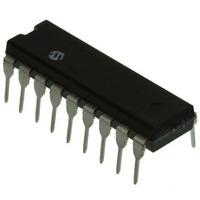PIC16F87-I/P Microchip Technology, PIC16F87-I/P Datasheet - Page 7

PIC16F87-I/P
Manufacturer Part Number
PIC16F87-I/P
Description
IC MCU FLASH 4KX14 EEPROM 18DIP
Manufacturer
Microchip Technology
Series
PIC® 16Fr
Datasheets
1.PIC16F616T-ISL.pdf
(8 pages)
2.PIC16F688T-ISL.pdf
(688 pages)
3.PIC16F818-ISO.pdf
(6 pages)
4.PIC16F87-IP.pdf
(228 pages)
5.PIC16F87-IP.pdf
(8 pages)
6.PIC16F87-IP.pdf
(4 pages)
7.PIC16F87-IP.pdf
(8 pages)
8.PIC16F87-IP.pdf
(24 pages)
9.PIC16F88-ISO.pdf
(214 pages)
Specifications of PIC16F87-I/P
Program Memory Type
FLASH
Program Memory Size
7KB (4K x 14)
Package / Case
18-DIP (0.300", 7.62mm)
Core Processor
PIC
Core Size
8-Bit
Speed
20MHz
Connectivity
I²C, SPI, UART/USART
Peripherals
Brown-out Detect/Reset, POR, PWM, WDT
Number Of I /o
16
Eeprom Size
256 x 8
Ram Size
368 x 8
Voltage - Supply (vcc/vdd)
4 V ~ 5.5 V
Oscillator Type
Internal
Operating Temperature
-40°C ~ 85°C
Processor Series
PIC16F
Core
PIC
Data Bus Width
8 bit
Data Ram Size
368 B
Interface Type
SSP/USART
Maximum Clock Frequency
20 MHz
Number Of Programmable I/os
16
Number Of Timers
3
Operating Supply Voltage
2 V to 5.5 V
Maximum Operating Temperature
+ 85 C
Mounting Style
Through Hole
3rd Party Development Tools
52715-96, 52716-328, 52717-734
Development Tools By Supplier
PG164130, DV164035, DV244005, DV164005, PG164120, ICE2000, DM163014
Minimum Operating Temperature
- 40 C
Package
18PDIP
Device Core
PIC
Family Name
PIC16
Maximum Speed
20 MHz
Lead Free Status / RoHS Status
Lead free / RoHS Compliant
For Use With
ACICE0202 - ADAPTER MPLABICE 18P 300 MILAC164010 - MODULE SKT PROMATEII DIP/SOIC
Data Converters
-
Lead Free Status / Rohs Status
Lead free / RoHS Compliant
Available stocks
Company
Part Number
Manufacturer
Quantity
Price
Company:
Part Number:
PIC16F87-I/P
Manufacturer:
MICROCHIP
Quantity:
3 000
3.4
Program mode is entered by holding pins RB6 and RB7
low, while raising MCLR pin from V
voltage). In this mode, the state of the RB3 pin does not
effect programming. Low-Voltage ICSP Programming
mode is entered by raising RB3 from V
then applying V
user program memory, as well as the configuration
memory, can be accessed and programmed in serial
fashion. The mode of operation is serial, and the
memory accessed is the user program memory. RB6
and RB7 are Schmitt Trigger inputs in this mode.
The sequence that enters the device into the
Programming mode places all other logic into the
RESET state (the MCLR pin was initially at V
means all I/O are in the RESET state (high-impedance
inputs).
A device RESET will clear the PC and set the address
to ‘0’. The ‘Increment Address’ command will
increment the PC. The ‘Load Configuration’ command
will set the PC to 0x2000. The available commands are
shown in Table 3-1.
The normal sequence for programming four program
memory words at a time is as follows:
1.
2.
3.
4.
5.
6.
7.
8.
9.
10. Wait tprog1.
11. Issue an ‘End Programming’ command.
12. Increment to the next address.
13. Repeat steps 5 through 12 seven times to
2010 Microchip Technology Inc.
Note:
Note:
Set pointer to row location.
Issue a ‘Begin Erase’ command.
Wait tprog2.
Issue an ‘End Programming’ command.
Load a word at the current program memory
address using the ‘Load Data’ command.
Issue an ‘Increment Address’ command.
Load a word at the current program memory
address using the ‘Load Data’ command.
Repeat Step 6 and Step 7 two times.
Issue a ‘Begin Programming’ command to begin
programming.
Program Mode
The Osc must not have 72 osc clocks
while the device MCLR is between V
V
The MCLR pin should be raised from
below V
(V
ensures that the device always enters
Programming
instructions that may be in program
memory can be executed. Otherwise,
unintended instruction execution could
occur when the INTRC clock source is
configured as the primary clock. Refer to
Figure 7-1.
IHH
PP
DD
.
), within 250 µs of V
to MCLR. Once in this mode, the
IL
to above the minimum V
mode
IL
before
DD
IL
to V
to V
rise. This
IHH
IL
DD
IL
). This
, and
(high
and
any
IHH
The address and program counter are reset to 0x0000
by resetting the device (taking MCLR below V
re-entering
configuration memory may then be read or verified
using the ‘Read Data’ and ‘Increment Address’
commands.
3.4.1
Low-voltage ICSP Programming mode allows a
PIC16F87/88 device to be programmed using V
only. However, when this mode is enabled by a
Configuration bit (LVP), the PIC16F87/88 device
dedicates RB3 to control entry/exit into Programming
mode.
When the LVP bit is set to ‘1’, the Low-voltage ICSP
Programming entry is enabled. Since the LVP
Configuration
Programming entry in its erased state, an erased
device will have the LVP bit enabled at the factory.
While LVP is ‘1’, RB3 is dedicated to Low-voltage ICSP
Programming. The following LVP steps assume the
LVP bit is set in the Configuration register.
1.
2.
3.
4.
All other specifications for High-voltage ICSP apply.
To disable Low-voltage ICSP mode, the LVP bit must
be programmed to ‘0’. This must be done while entered
with the High-voltage Entry mode (LVP bit = 1). RB3 is
now a general purpose I/O pin.
program one row.
Apply V
Drive MCLR low.
Apply V
Apply V
LOW-VOLTAGE ICSP
PROGRAMMING MODE
DD
DD
DD
Programming
to the V
to the RB3/PGM pin.
to the MCLR pin.
bit
PIC16F87/88
allows
DD
pin.
mode.
Low-voltage
DS39607C-page 7
Program
IL
) and
ICSP
and
DD



















